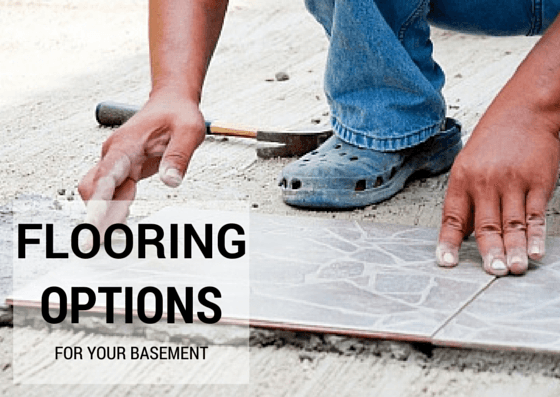If you're only using your basement as extra storage space or a laundry room, you're missing out on potential living space in your home. Many basements are the same size as your living space, so if it's remodeled into a finished space you could nearly double your home's usable area. An easy place to start when finishing your basement is your flooring.

Basement challenges
After you've decided on the purpose of your basement, whether it's a wet bar, movie theater or home-gym, you'll need to realize that there are certain challenges specific to basement spaces to keep in mind when choosing basement flooring. You may have to deal with sub-flooring that is uneven, too much moisture or even ceiling height problems.
Once you've figured out the issues specific to your basement, choose the best option for your basement flooring.
"Wood" floors
Installing hardwood floors in a basement can be tricky - mainly because of the moisture that can easily accumulate. If you're interested in the look of wood flooring, opt for engineered or laminate wood flooring. They won't be as prone to damage from any moisture in your basement.
Engineered and laminate wood flooring can be more expensive to install than carpeting, but less expensive than ceramic tile. Engineered wood floors are made of a plywood core with a real hardwood finish on the top layer and can scratch like real wood. Laminate wood flooring is essentially sawdust and glue compressed under pressure and heat with a picture of wood on top.
Both types of floors are installed over a padding and "float" and are not attached to any of the walls. This allows for the floor to expand and contract with temperatures. Both finishes wear well and will last for years.
Ceramic tile
Ceramic tiles are the most durable option for your floors. If moisture is a problem in your basement, you can easily mop it up. Tiles are also more forgiving on uneven floors, so minimal leveling might be needed. Installing individual tiles is recommended in your basement so the tile can easily be replaced should one become cracked or raised from water creeping underneath.
Carpeting
Carpeting can be used in basements, but keep in mind if you have moisture creeping into your home through your basement -- it's not recommended to install carpeting. If you don't have a
moisture problem in your basement then carpeting would add warmth and a bit of
insulation to your basement. When choosing flooring for your basement just keep this rule of thumb in mind: if you choose any type of flooring that has organic material affected by water, you run the risk of damage to your floor if there is ever a flood or excessive moisture in your basement. You may also run the risk of unseen mold building up underneath which can lower the quality of air in your home.